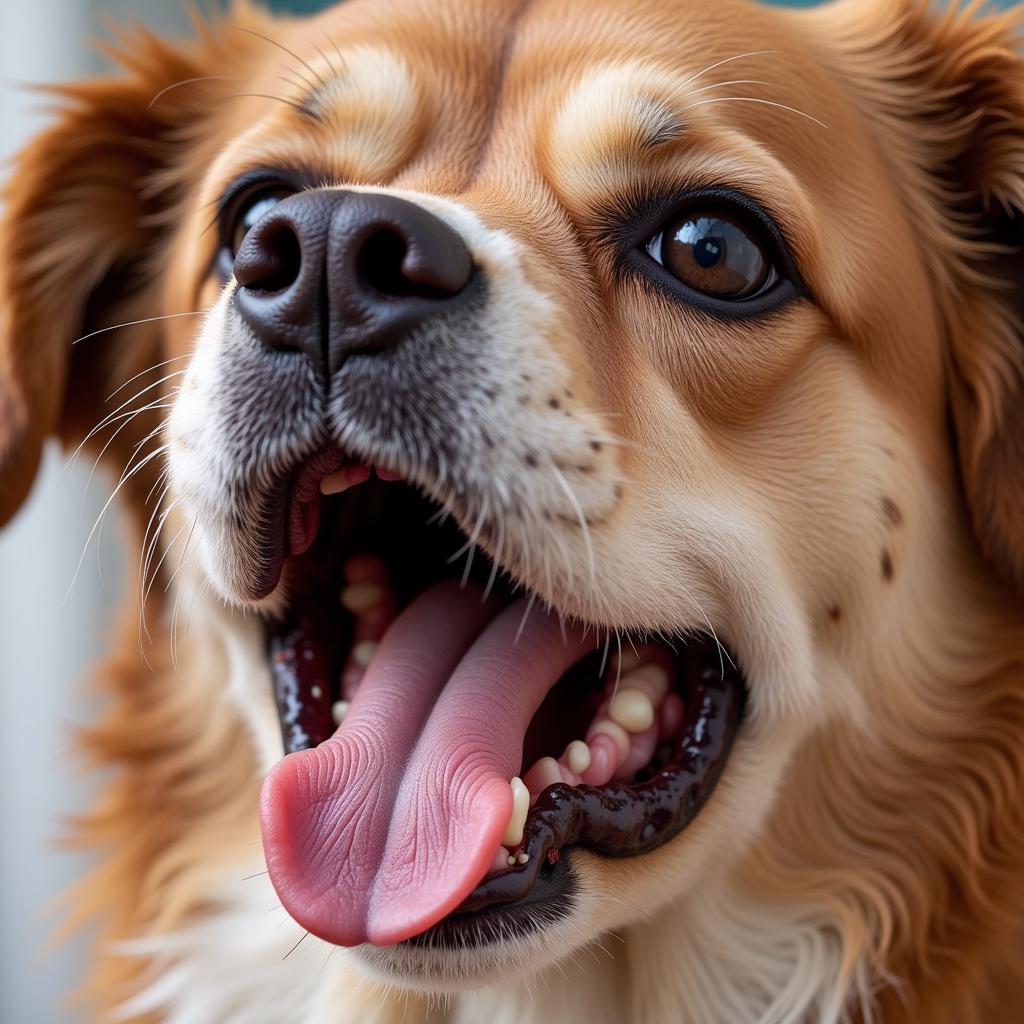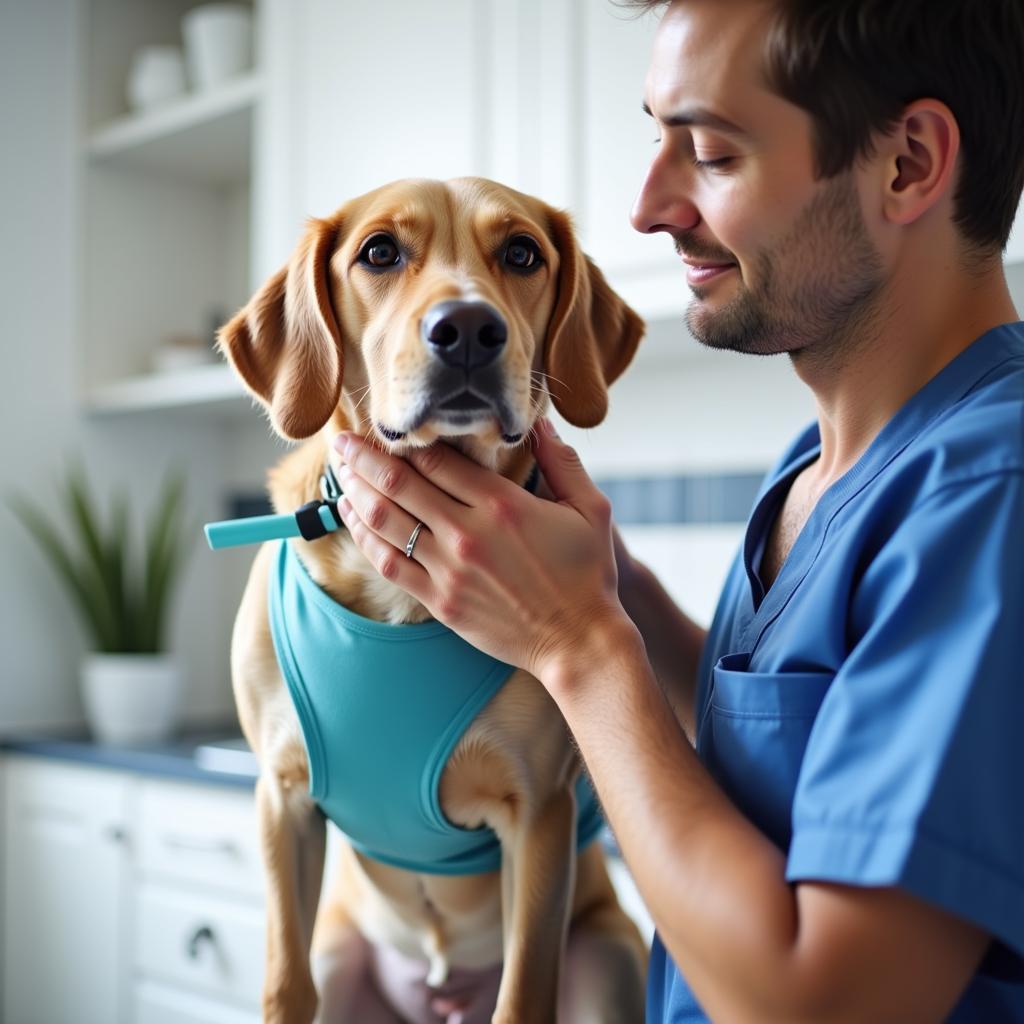Dog Regurgitating Undigested Food can be a concerning sight for any pet owner. This article will delve into the reasons why your dog might be regurgitating undigested food, explore potential treatments, and offer preventive measures to safeguard your furry friend’s health. We’ll differentiate regurgitation from vomiting, discuss common causes, and guide you on when to seek veterinary care.
Understanding Why Your Dog Regurgitates Undigested Food
Several factors can contribute to a dog regurgitating undigested food. It’s essential to differentiate regurgitation from vomiting, as they indicate different underlying issues. Regurgitation is a passive expulsion of undigested food from the esophagus, often appearing tubular and undigested. Vomiting, on the other hand, is a forceful expulsion of stomach contents, usually appearing partially digested and mixed with stomach acid.
Common Causes of Regurgitation in Dogs
One of the most common reasons for regurgitation is megaesophagus, a condition where the esophagus loses its ability to contract and move food to the stomach. Other potential causes include esophageal strictures, foreign bodies lodged in the esophagus, and certain neurological disorders. Sometimes, the simple act of eating too quickly can also lead to regurgitation.
 Dog Regurgitating Undigested Food due to Megaesophagus
Dog Regurgitating Undigested Food due to Megaesophagus
Dietary factors can also play a role. Feeding your dog large pieces of kibble or allowing them to gulp down their food too quickly can overwhelm the esophagus, leading to regurgitation. Similarly, certain medical conditions, such as hypothyroidism and myasthenia gravis, can also contribute to this issue.
When to Seek Veterinary Care
If your dog is frequently regurgitating undigested food, it’s crucial to seek veterinary care. While an occasional incident might not be cause for immediate concern, repeated episodes can indicate a more serious underlying health problem that requires professional diagnosis and treatment.
 Dog at the Vet for Regurgitation Examination
Dog at the Vet for Regurgitation Examination
Diagnosing and Treating Regurgitation in Dogs
Your veterinarian will likely conduct a thorough physical examination and may recommend further diagnostic tests, such as X-rays, endoscopy, or esophageal motility studies, to pinpoint the cause of the regurgitation. The specific treatment will depend on the underlying condition.
Treatment Options and Management Strategies
Treatment for megaesophagus may involve dietary changes, such as feeding small, frequent meals of a soft, easily digestible food. Elevating the food and water bowls can also help gravity assist the movement of food into the stomach. In some cases, medication may be prescribed to improve esophageal motility. If a foreign body is the culprit, surgical removal may be necessary.
“Early diagnosis and appropriate management are crucial for improving the quality of life for dogs with regurgitation issues,” says Dr. Emily Carter, DVM, a specialist in veterinary internal medicine. “With proper care, many dogs can live comfortably even with chronic conditions like megaesophagus.”
Preventing Regurgitation in Dogs
While not all causes of regurgitation are preventable, some proactive steps can minimize the risk. Feeding smaller, more frequent meals and ensuring your dog eats slowly can help prevent esophageal overload. Choosing an appropriately sized kibble and avoiding feeding large chunks of food can also be beneficial.
“Simple dietary adjustments and mindful feeding practices can make a significant difference in preventing regurgitation episodes,” adds Dr. Carter. “Paying attention to your dog’s eating habits and consulting with your veterinarian about any concerns are essential for maintaining their digestive health.”
Conclusion
Dog regurgitating undigested food is a symptom that shouldn’t be ignored. By understanding the potential causes, seeking timely veterinary care, and implementing preventive measures, you can help ensure your furry companion enjoys a healthy and comfortable life. Remember to consult with your veterinarian for personalized advice and treatment plans based on your dog’s specific needs.
FAQs
- What is the difference between regurgitation and vomiting in dogs?
- What are the common causes of regurgitation in dogs?
- When should I take my dog to the vet for regurgitation?
- How is regurgitation diagnosed in dogs?
- What are the treatment options for regurgitation in dogs?
- Can regurgitation in dogs be prevented?
- What kind of diet is recommended for dogs with regurgitation?
Further Reading and Resources on Mina Cones Food
- Understanding Your Dog’s Digestive Health
- Common Canine Digestive Problems
- Choosing the Right Food for Your Dog
Need more help? Contact us! Phone: 02437655121, Email: [email protected] Or visit us at: 3PGH+8R9, ĐT70A, thôn Trung, Bắc Từ Liêm, Hà Nội, Việt Nam. We have a 24/7 customer service team.